Individual Assignment: Ethics and Organizations - Toyota & Volkswagen
VerifiedAdded on 2020/10/26
|14
|3220
|393
Report
AI Summary
This report analyzes the ethical breaches of Toyota and Volkswagen. The Toyota case examines the delayed recall of defective vehicles, highlighting the company's prioritization of cost-saving over consumer safety. The Volkswagen case delves into the diesel emission scandal, where the company cheated on emission tests using a 'defeat device'. The report justifies the unethical issues from both companies' perspectives, considering factors such as financial implications and internal pressures. It provides recommendations for improving communication, re-establishing image and credibility, and offering benefits to consumers and the environment. The report concludes with a discussion of ethical theory and its application to these cases, emphasizing the importance of ethical decision-making and corporate social responsibility. The assignment was completed by a student as part of their Ethics and Organizations course.
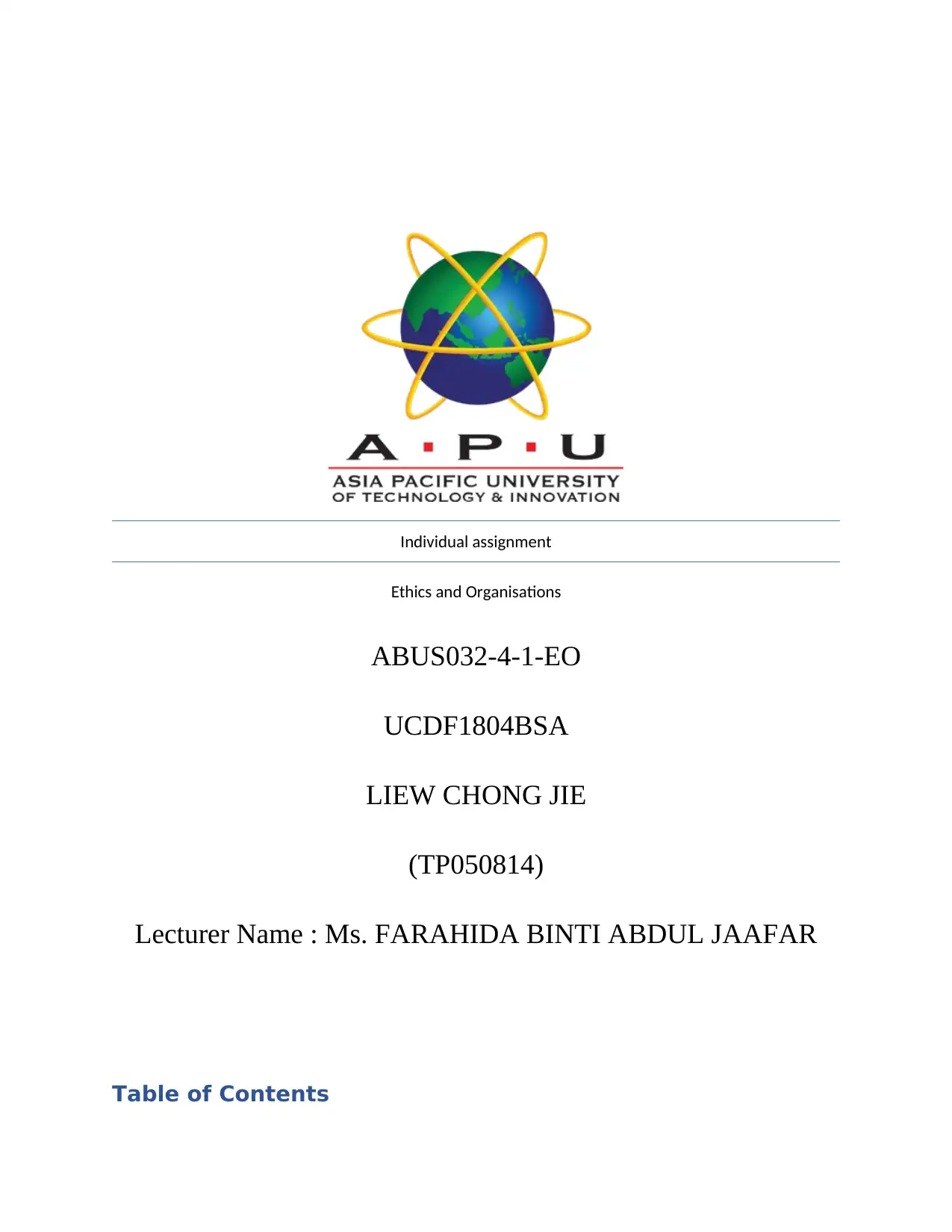
Individual assignment
Ethics and Organisations
ABUS032-4-1-EO
UCDF1804BSA
LIEW CHONG JIE
(TP050814)
Lecturer Name : Ms. FARAHIDA BINTI ABDUL JAAFAR
Table of Contents
Ethics and Organisations
ABUS032-4-1-EO
UCDF1804BSA
LIEW CHONG JIE
(TP050814)
Lecturer Name : Ms. FARAHIDA BINTI ABDUL JAAFAR
Table of Contents
Paraphrase This Document
Need a fresh take? Get an instant paraphrase of this document with our AI Paraphraser
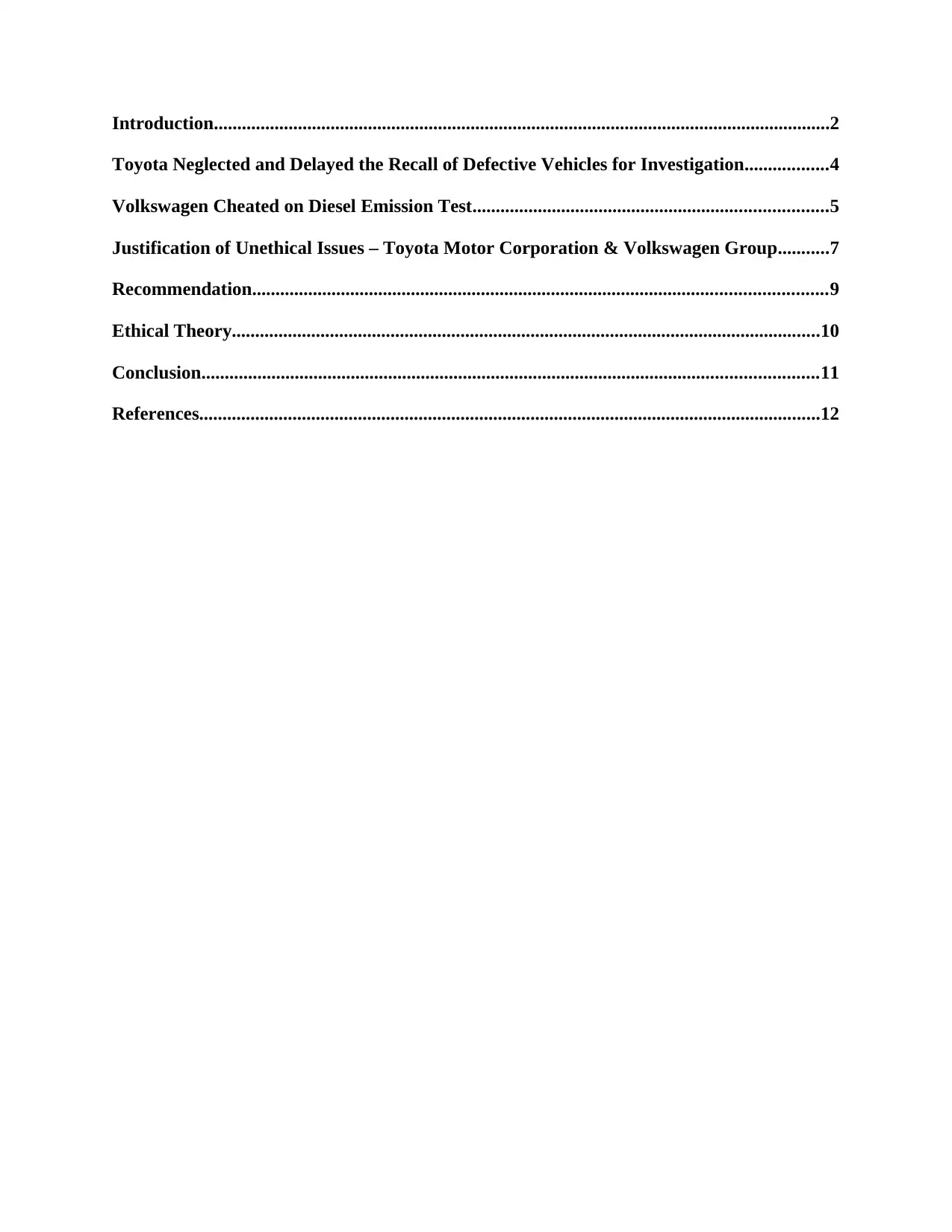
Introduction....................................................................................................................................2
Toyota Neglected and Delayed the Recall of Defective Vehicles for Investigation..................4
Volkswagen Cheated on Diesel Emission Test............................................................................5
Justification of Unethical Issues – Toyota Motor Corporation & Volkswagen Group...........7
Recommendation...........................................................................................................................9
Ethical Theory..............................................................................................................................10
Conclusion....................................................................................................................................11
References.....................................................................................................................................12
Toyota Neglected and Delayed the Recall of Defective Vehicles for Investigation..................4
Volkswagen Cheated on Diesel Emission Test............................................................................5
Justification of Unethical Issues – Toyota Motor Corporation & Volkswagen Group...........7
Recommendation...........................................................................................................................9
Ethical Theory..............................................................................................................................10
Conclusion....................................................................................................................................11
References.....................................................................................................................................12
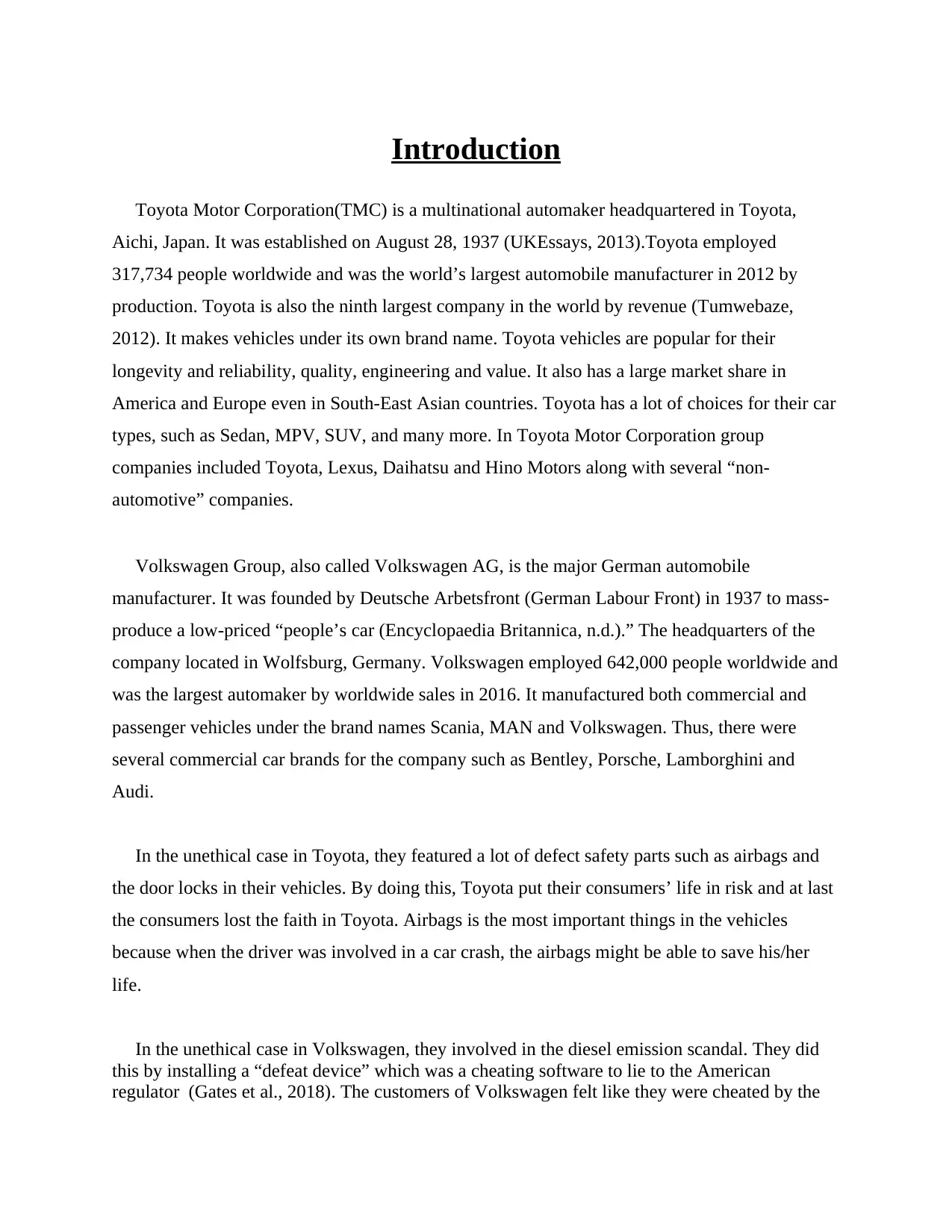
Introduction
Toyota Motor Corporation(TMC) is a multinational automaker headquartered in Toyota,
Aichi, Japan. It was established on August 28, 1937 (UKEssays, 2013).Toyota employed
317,734 people worldwide and was the world’s largest automobile manufacturer in 2012 by
production. Toyota is also the ninth largest company in the world by revenue (Tumwebaze,
2012). It makes vehicles under its own brand name. Toyota vehicles are popular for their
longevity and reliability, quality, engineering and value. It also has a large market share in
America and Europe even in South-East Asian countries. Toyota has a lot of choices for their car
types, such as Sedan, MPV, SUV, and many more. In Toyota Motor Corporation group
companies included Toyota, Lexus, Daihatsu and Hino Motors along with several “non-
automotive” companies.
Volkswagen Group, also called Volkswagen AG, is the major German automobile
manufacturer. It was founded by Deutsche Arbetsfront (German Labour Front) in 1937 to mass-
produce a low-priced “people’s car (Encyclopaedia Britannica, n.d.).” The headquarters of the
company located in Wolfsburg, Germany. Volkswagen employed 642,000 people worldwide and
was the largest automaker by worldwide sales in 2016. It manufactured both commercial and
passenger vehicles under the brand names Scania, MAN and Volkswagen. Thus, there were
several commercial car brands for the company such as Bentley, Porsche, Lamborghini and
Audi.
In the unethical case in Toyota, they featured a lot of defect safety parts such as airbags and
the door locks in their vehicles. By doing this, Toyota put their consumers’ life in risk and at last
the consumers lost the faith in Toyota. Airbags is the most important things in the vehicles
because when the driver was involved in a car crash, the airbags might be able to save his/her
life.
In the unethical case in Volkswagen, they involved in the diesel emission scandal. They did
this by installing a “defeat device” which was a cheating software to lie to the American
regulator (Gates et al., 2018). The customers of Volkswagen felt like they were cheated by the
Toyota Motor Corporation(TMC) is a multinational automaker headquartered in Toyota,
Aichi, Japan. It was established on August 28, 1937 (UKEssays, 2013).Toyota employed
317,734 people worldwide and was the world’s largest automobile manufacturer in 2012 by
production. Toyota is also the ninth largest company in the world by revenue (Tumwebaze,
2012). It makes vehicles under its own brand name. Toyota vehicles are popular for their
longevity and reliability, quality, engineering and value. It also has a large market share in
America and Europe even in South-East Asian countries. Toyota has a lot of choices for their car
types, such as Sedan, MPV, SUV, and many more. In Toyota Motor Corporation group
companies included Toyota, Lexus, Daihatsu and Hino Motors along with several “non-
automotive” companies.
Volkswagen Group, also called Volkswagen AG, is the major German automobile
manufacturer. It was founded by Deutsche Arbetsfront (German Labour Front) in 1937 to mass-
produce a low-priced “people’s car (Encyclopaedia Britannica, n.d.).” The headquarters of the
company located in Wolfsburg, Germany. Volkswagen employed 642,000 people worldwide and
was the largest automaker by worldwide sales in 2016. It manufactured both commercial and
passenger vehicles under the brand names Scania, MAN and Volkswagen. Thus, there were
several commercial car brands for the company such as Bentley, Porsche, Lamborghini and
Audi.
In the unethical case in Toyota, they featured a lot of defect safety parts such as airbags and
the door locks in their vehicles. By doing this, Toyota put their consumers’ life in risk and at last
the consumers lost the faith in Toyota. Airbags is the most important things in the vehicles
because when the driver was involved in a car crash, the airbags might be able to save his/her
life.
In the unethical case in Volkswagen, they involved in the diesel emission scandal. They did
this by installing a “defeat device” which was a cheating software to lie to the American
regulator (Gates et al., 2018). The customers of Volkswagen felt like they were cheated by the
⊘ This is a preview!⊘
Do you want full access?
Subscribe today to unlock all pages.

Trusted by 1+ million students worldwide
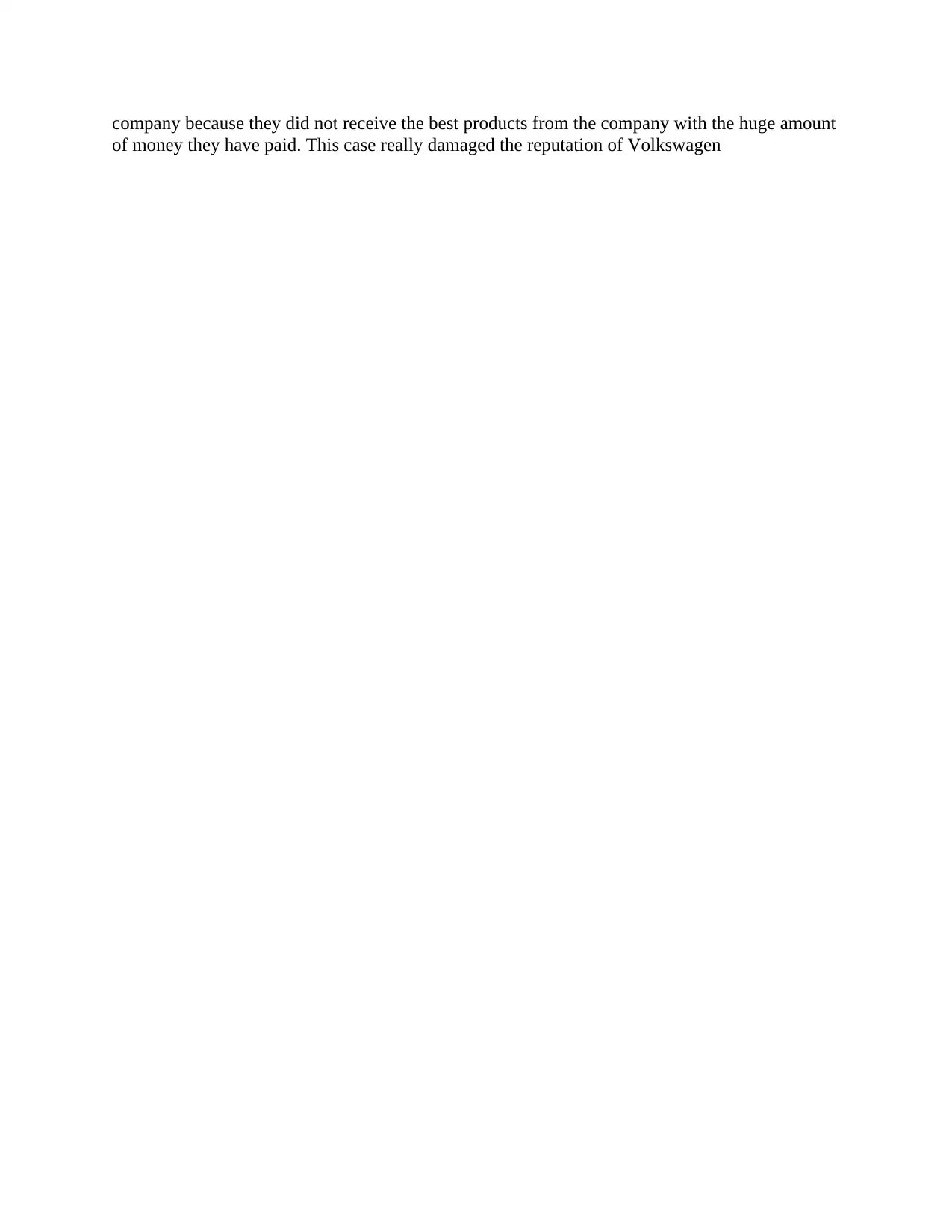
company because they did not receive the best products from the company with the huge amount
of money they have paid. This case really damaged the reputation of Volkswagen
of money they have paid. This case really damaged the reputation of Volkswagen
Paraphrase This Document
Need a fresh take? Get an instant paraphrase of this document with our AI Paraphraser
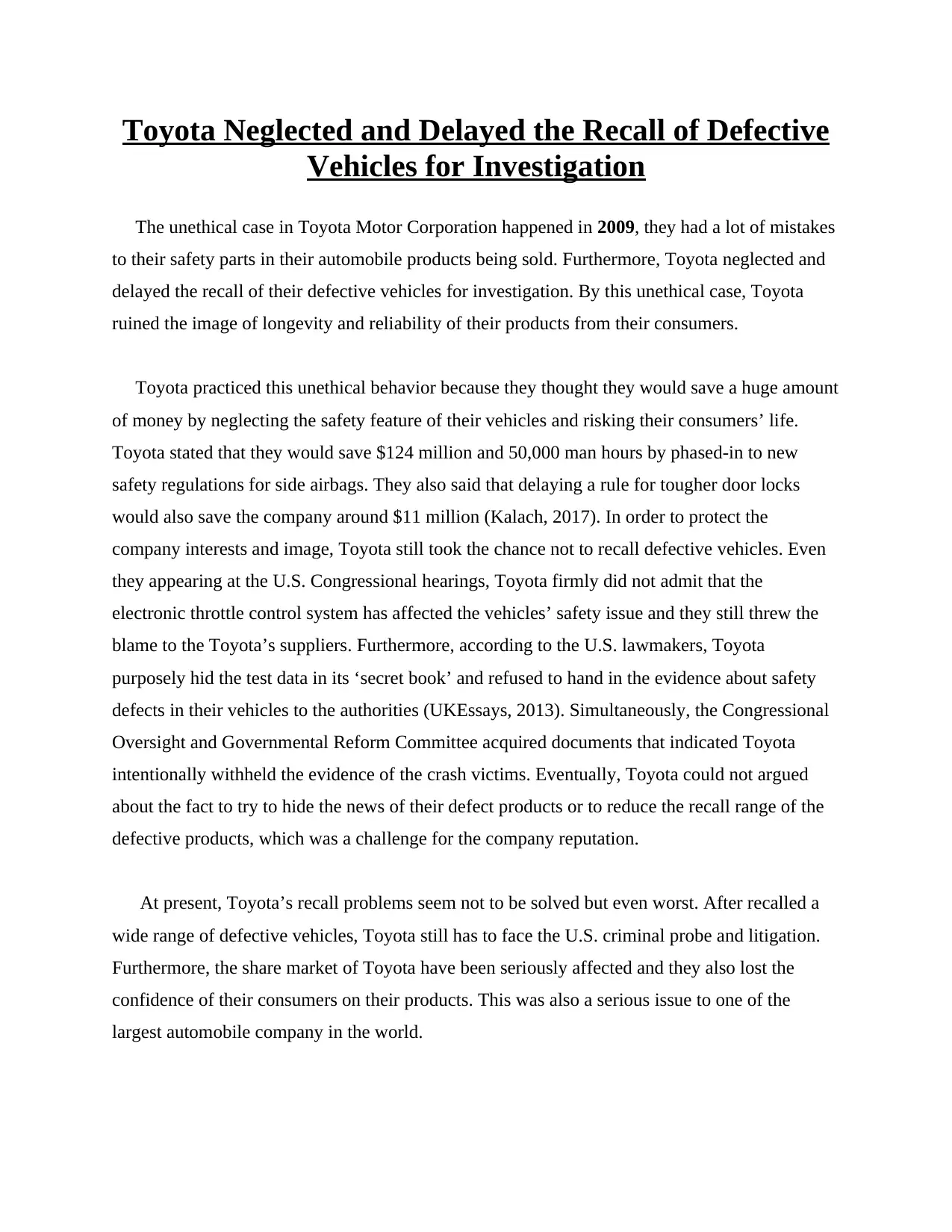
Toyota Neglected and Delayed the Recall of Defective
Vehicles for Investigation
The unethical case in Toyota Motor Corporation happened in 2009, they had a lot of mistakes
to their safety parts in their automobile products being sold. Furthermore, Toyota neglected and
delayed the recall of their defective vehicles for investigation. By this unethical case, Toyota
ruined the image of longevity and reliability of their products from their consumers.
Toyota practiced this unethical behavior because they thought they would save a huge amount
of money by neglecting the safety feature of their vehicles and risking their consumers’ life.
Toyota stated that they would save $124 million and 50,000 man hours by phased-in to new
safety regulations for side airbags. They also said that delaying a rule for tougher door locks
would also save the company around $11 million (Kalach, 2017). In order to protect the
company interests and image, Toyota still took the chance not to recall defective vehicles. Even
they appearing at the U.S. Congressional hearings, Toyota firmly did not admit that the
electronic throttle control system has affected the vehicles’ safety issue and they still threw the
blame to the Toyota’s suppliers. Furthermore, according to the U.S. lawmakers, Toyota
purposely hid the test data in its ‘secret book’ and refused to hand in the evidence about safety
defects in their vehicles to the authorities (UKEssays, 2013). Simultaneously, the Congressional
Oversight and Governmental Reform Committee acquired documents that indicated Toyota
intentionally withheld the evidence of the crash victims. Eventually, Toyota could not argued
about the fact to try to hide the news of their defect products or to reduce the recall range of the
defective products, which was a challenge for the company reputation.
At present, Toyota’s recall problems seem not to be solved but even worst. After recalled a
wide range of defective vehicles, Toyota still has to face the U.S. criminal probe and litigation.
Furthermore, the share market of Toyota have been seriously affected and they also lost the
confidence of their consumers on their products. This was also a serious issue to one of the
largest automobile company in the world.
Vehicles for Investigation
The unethical case in Toyota Motor Corporation happened in 2009, they had a lot of mistakes
to their safety parts in their automobile products being sold. Furthermore, Toyota neglected and
delayed the recall of their defective vehicles for investigation. By this unethical case, Toyota
ruined the image of longevity and reliability of their products from their consumers.
Toyota practiced this unethical behavior because they thought they would save a huge amount
of money by neglecting the safety feature of their vehicles and risking their consumers’ life.
Toyota stated that they would save $124 million and 50,000 man hours by phased-in to new
safety regulations for side airbags. They also said that delaying a rule for tougher door locks
would also save the company around $11 million (Kalach, 2017). In order to protect the
company interests and image, Toyota still took the chance not to recall defective vehicles. Even
they appearing at the U.S. Congressional hearings, Toyota firmly did not admit that the
electronic throttle control system has affected the vehicles’ safety issue and they still threw the
blame to the Toyota’s suppliers. Furthermore, according to the U.S. lawmakers, Toyota
purposely hid the test data in its ‘secret book’ and refused to hand in the evidence about safety
defects in their vehicles to the authorities (UKEssays, 2013). Simultaneously, the Congressional
Oversight and Governmental Reform Committee acquired documents that indicated Toyota
intentionally withheld the evidence of the crash victims. Eventually, Toyota could not argued
about the fact to try to hide the news of their defect products or to reduce the recall range of the
defective products, which was a challenge for the company reputation.
At present, Toyota’s recall problems seem not to be solved but even worst. After recalled a
wide range of defective vehicles, Toyota still has to face the U.S. criminal probe and litigation.
Furthermore, the share market of Toyota have been seriously affected and they also lost the
confidence of their consumers on their products. This was also a serious issue to one of the
largest automobile company in the world.
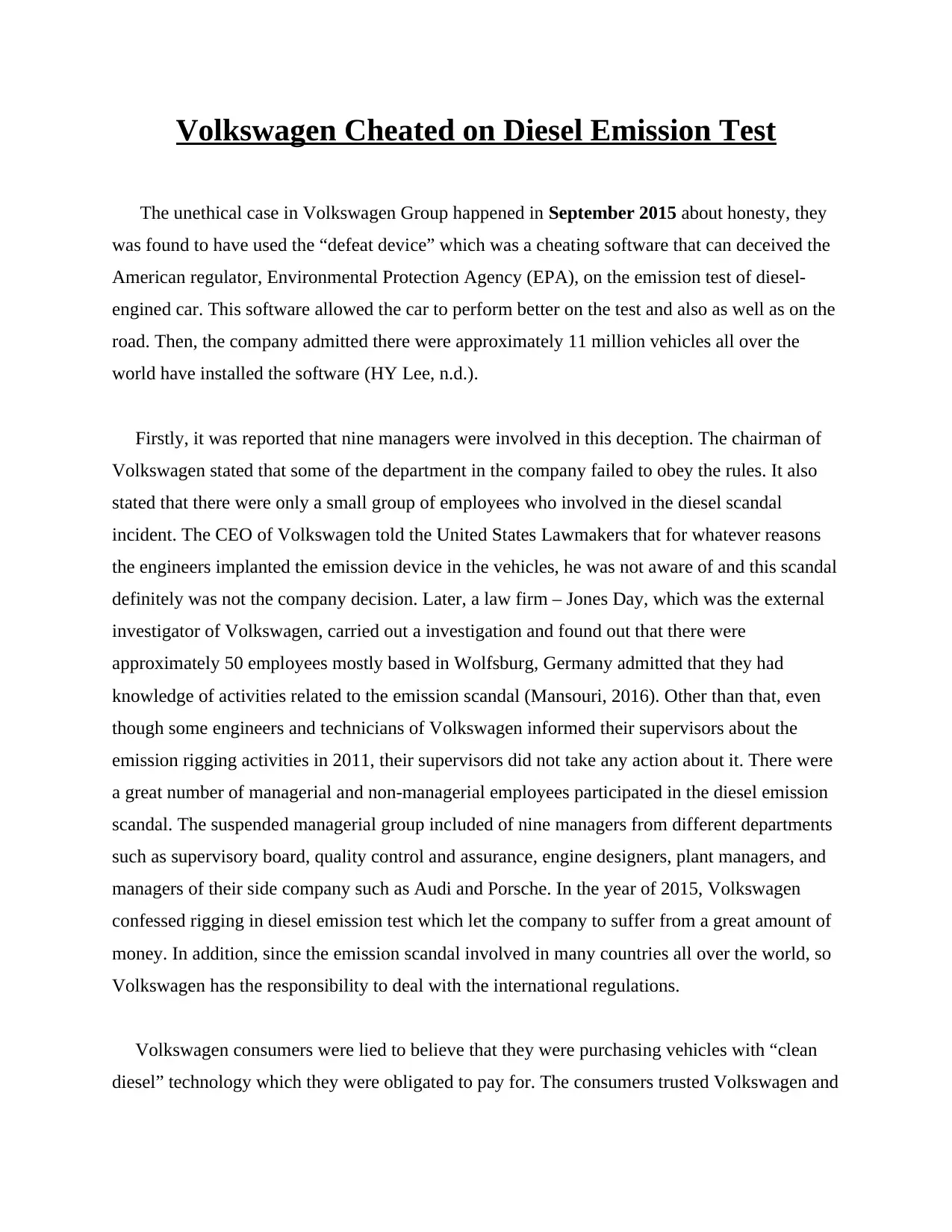
Volkswagen Cheated on Diesel Emission Test
The unethical case in Volkswagen Group happened in September 2015 about honesty, they
was found to have used the “defeat device” which was a cheating software that can deceived the
American regulator, Environmental Protection Agency (EPA), on the emission test of diesel-
engined car. This software allowed the car to perform better on the test and also as well as on the
road. Then, the company admitted there were approximately 11 million vehicles all over the
world have installed the software (HY Lee, n.d.).
Firstly, it was reported that nine managers were involved in this deception. The chairman of
Volkswagen stated that some of the department in the company failed to obey the rules. It also
stated that there were only a small group of employees who involved in the diesel scandal
incident. The CEO of Volkswagen told the United States Lawmakers that for whatever reasons
the engineers implanted the emission device in the vehicles, he was not aware of and this scandal
definitely was not the company decision. Later, a law firm – Jones Day, which was the external
investigator of Volkswagen, carried out a investigation and found out that there were
approximately 50 employees mostly based in Wolfsburg, Germany admitted that they had
knowledge of activities related to the emission scandal (Mansouri, 2016). Other than that, even
though some engineers and technicians of Volkswagen informed their supervisors about the
emission rigging activities in 2011, their supervisors did not take any action about it. There were
a great number of managerial and non-managerial employees participated in the diesel emission
scandal. The suspended managerial group included of nine managers from different departments
such as supervisory board, quality control and assurance, engine designers, plant managers, and
managers of their side company such as Audi and Porsche. In the year of 2015, Volkswagen
confessed rigging in diesel emission test which let the company to suffer from a great amount of
money. In addition, since the emission scandal involved in many countries all over the world, so
Volkswagen has the responsibility to deal with the international regulations.
Volkswagen consumers were lied to believe that they were purchasing vehicles with “clean
diesel” technology which they were obligated to pay for. The consumers trusted Volkswagen and
The unethical case in Volkswagen Group happened in September 2015 about honesty, they
was found to have used the “defeat device” which was a cheating software that can deceived the
American regulator, Environmental Protection Agency (EPA), on the emission test of diesel-
engined car. This software allowed the car to perform better on the test and also as well as on the
road. Then, the company admitted there were approximately 11 million vehicles all over the
world have installed the software (HY Lee, n.d.).
Firstly, it was reported that nine managers were involved in this deception. The chairman of
Volkswagen stated that some of the department in the company failed to obey the rules. It also
stated that there were only a small group of employees who involved in the diesel scandal
incident. The CEO of Volkswagen told the United States Lawmakers that for whatever reasons
the engineers implanted the emission device in the vehicles, he was not aware of and this scandal
definitely was not the company decision. Later, a law firm – Jones Day, which was the external
investigator of Volkswagen, carried out a investigation and found out that there were
approximately 50 employees mostly based in Wolfsburg, Germany admitted that they had
knowledge of activities related to the emission scandal (Mansouri, 2016). Other than that, even
though some engineers and technicians of Volkswagen informed their supervisors about the
emission rigging activities in 2011, their supervisors did not take any action about it. There were
a great number of managerial and non-managerial employees participated in the diesel emission
scandal. The suspended managerial group included of nine managers from different departments
such as supervisory board, quality control and assurance, engine designers, plant managers, and
managers of their side company such as Audi and Porsche. In the year of 2015, Volkswagen
confessed rigging in diesel emission test which let the company to suffer from a great amount of
money. In addition, since the emission scandal involved in many countries all over the world, so
Volkswagen has the responsibility to deal with the international regulations.
Volkswagen consumers were lied to believe that they were purchasing vehicles with “clean
diesel” technology which they were obligated to pay for. The consumers trusted Volkswagen and
⊘ This is a preview!⊘
Do you want full access?
Subscribe today to unlock all pages.

Trusted by 1+ million students worldwide
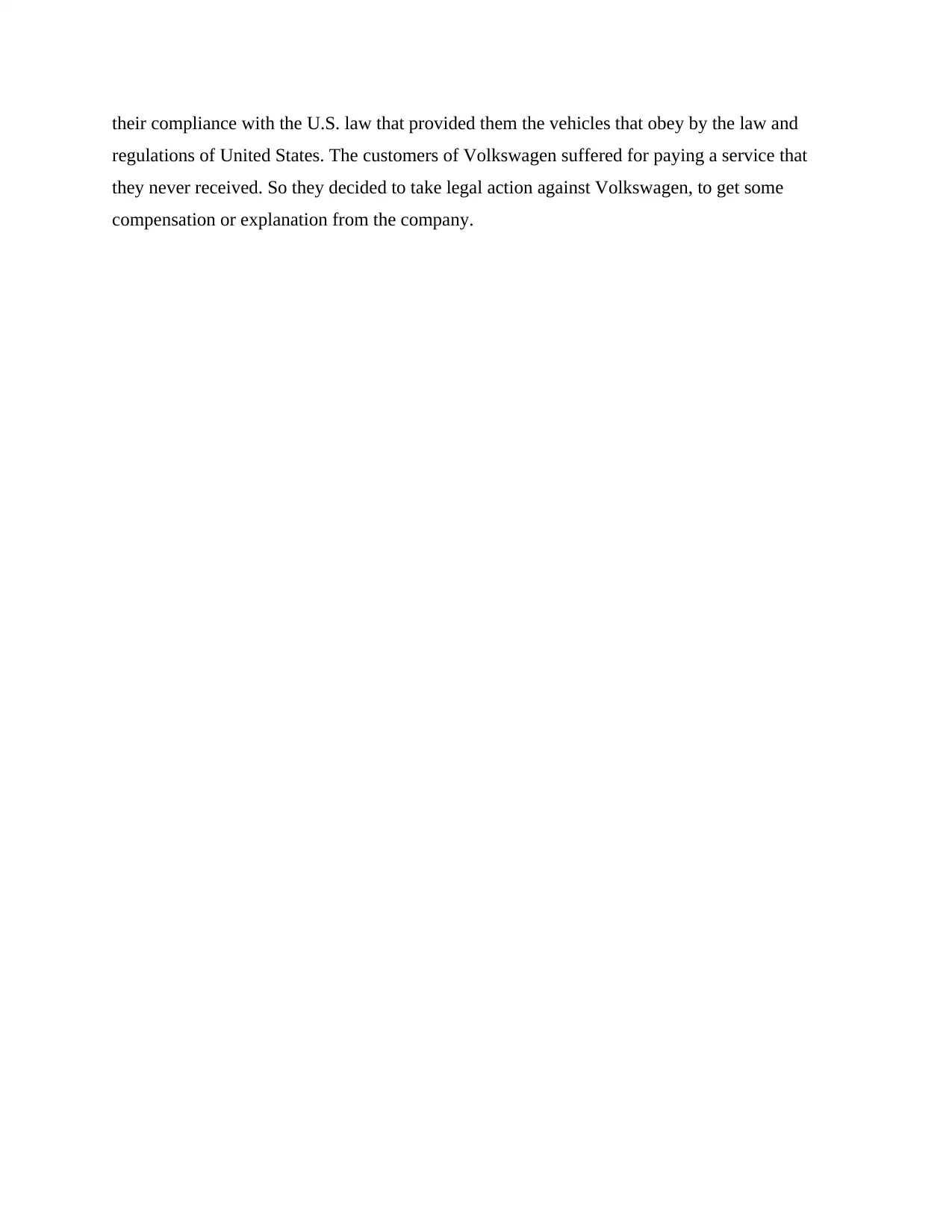
their compliance with the U.S. law that provided them the vehicles that obey by the law and
regulations of United States. The customers of Volkswagen suffered for paying a service that
they never received. So they decided to take legal action against Volkswagen, to get some
compensation or explanation from the company.
regulations of United States. The customers of Volkswagen suffered for paying a service that
they never received. So they decided to take legal action against Volkswagen, to get some
compensation or explanation from the company.
Paraphrase This Document
Need a fresh take? Get an instant paraphrase of this document with our AI Paraphraser
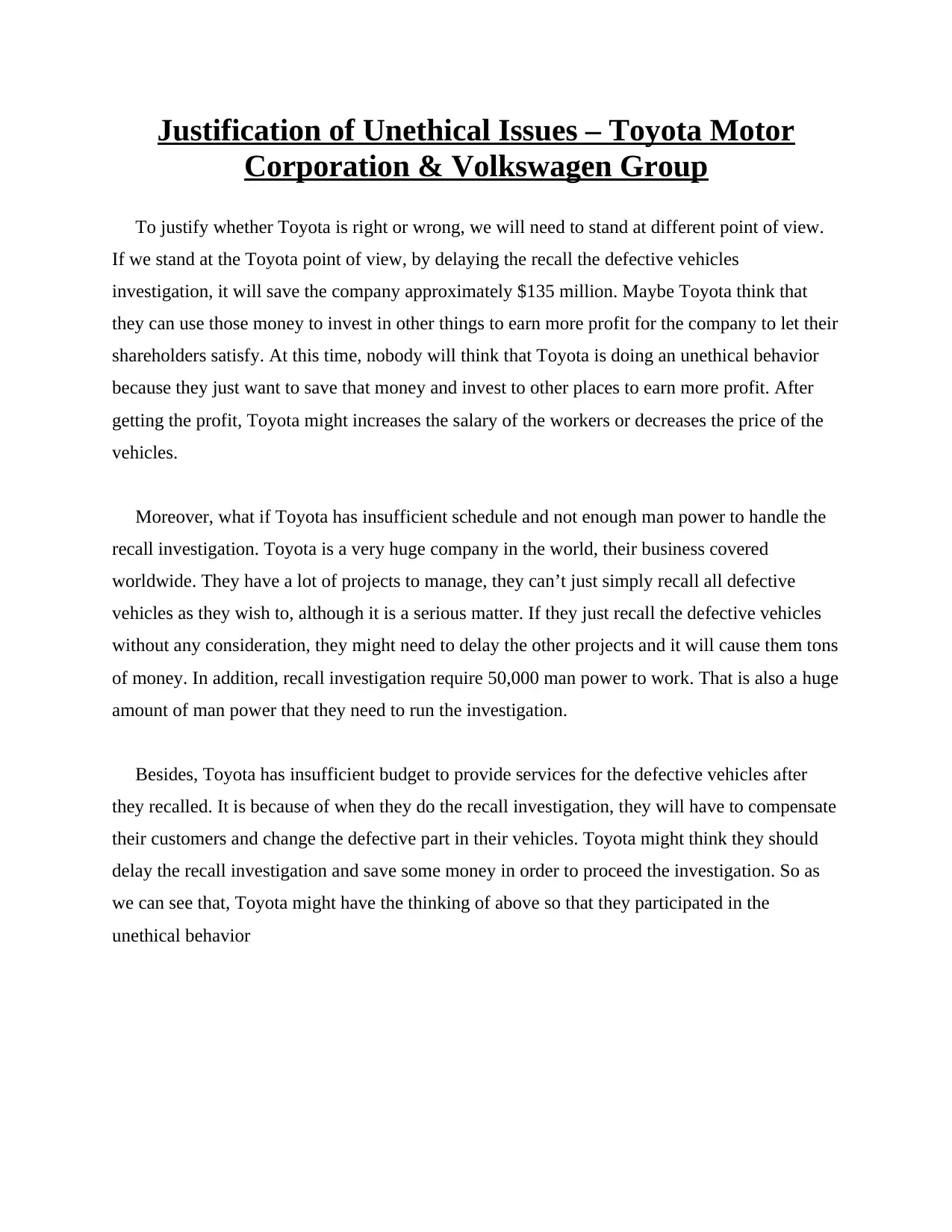
Justification of Unethical Issues – Toyota Motor
Corporation & Volkswagen Group
To justify whether Toyota is right or wrong, we will need to stand at different point of view.
If we stand at the Toyota point of view, by delaying the recall the defective vehicles
investigation, it will save the company approximately $135 million. Maybe Toyota think that
they can use those money to invest in other things to earn more profit for the company to let their
shareholders satisfy. At this time, nobody will think that Toyota is doing an unethical behavior
because they just want to save that money and invest to other places to earn more profit. After
getting the profit, Toyota might increases the salary of the workers or decreases the price of the
vehicles.
Moreover, what if Toyota has insufficient schedule and not enough man power to handle the
recall investigation. Toyota is a very huge company in the world, their business covered
worldwide. They have a lot of projects to manage, they can’t just simply recall all defective
vehicles as they wish to, although it is a serious matter. If they just recall the defective vehicles
without any consideration, they might need to delay the other projects and it will cause them tons
of money. In addition, recall investigation require 50,000 man power to work. That is also a huge
amount of man power that they need to run the investigation.
Besides, Toyota has insufficient budget to provide services for the defective vehicles after
they recalled. It is because of when they do the recall investigation, they will have to compensate
their customers and change the defective part in their vehicles. Toyota might think they should
delay the recall investigation and save some money in order to proceed the investigation. So as
we can see that, Toyota might have the thinking of above so that they participated in the
unethical behavior
Corporation & Volkswagen Group
To justify whether Toyota is right or wrong, we will need to stand at different point of view.
If we stand at the Toyota point of view, by delaying the recall the defective vehicles
investigation, it will save the company approximately $135 million. Maybe Toyota think that
they can use those money to invest in other things to earn more profit for the company to let their
shareholders satisfy. At this time, nobody will think that Toyota is doing an unethical behavior
because they just want to save that money and invest to other places to earn more profit. After
getting the profit, Toyota might increases the salary of the workers or decreases the price of the
vehicles.
Moreover, what if Toyota has insufficient schedule and not enough man power to handle the
recall investigation. Toyota is a very huge company in the world, their business covered
worldwide. They have a lot of projects to manage, they can’t just simply recall all defective
vehicles as they wish to, although it is a serious matter. If they just recall the defective vehicles
without any consideration, they might need to delay the other projects and it will cause them tons
of money. In addition, recall investigation require 50,000 man power to work. That is also a huge
amount of man power that they need to run the investigation.
Besides, Toyota has insufficient budget to provide services for the defective vehicles after
they recalled. It is because of when they do the recall investigation, they will have to compensate
their customers and change the defective part in their vehicles. Toyota might think they should
delay the recall investigation and save some money in order to proceed the investigation. So as
we can see that, Toyota might have the thinking of above so that they participated in the
unethical behavior
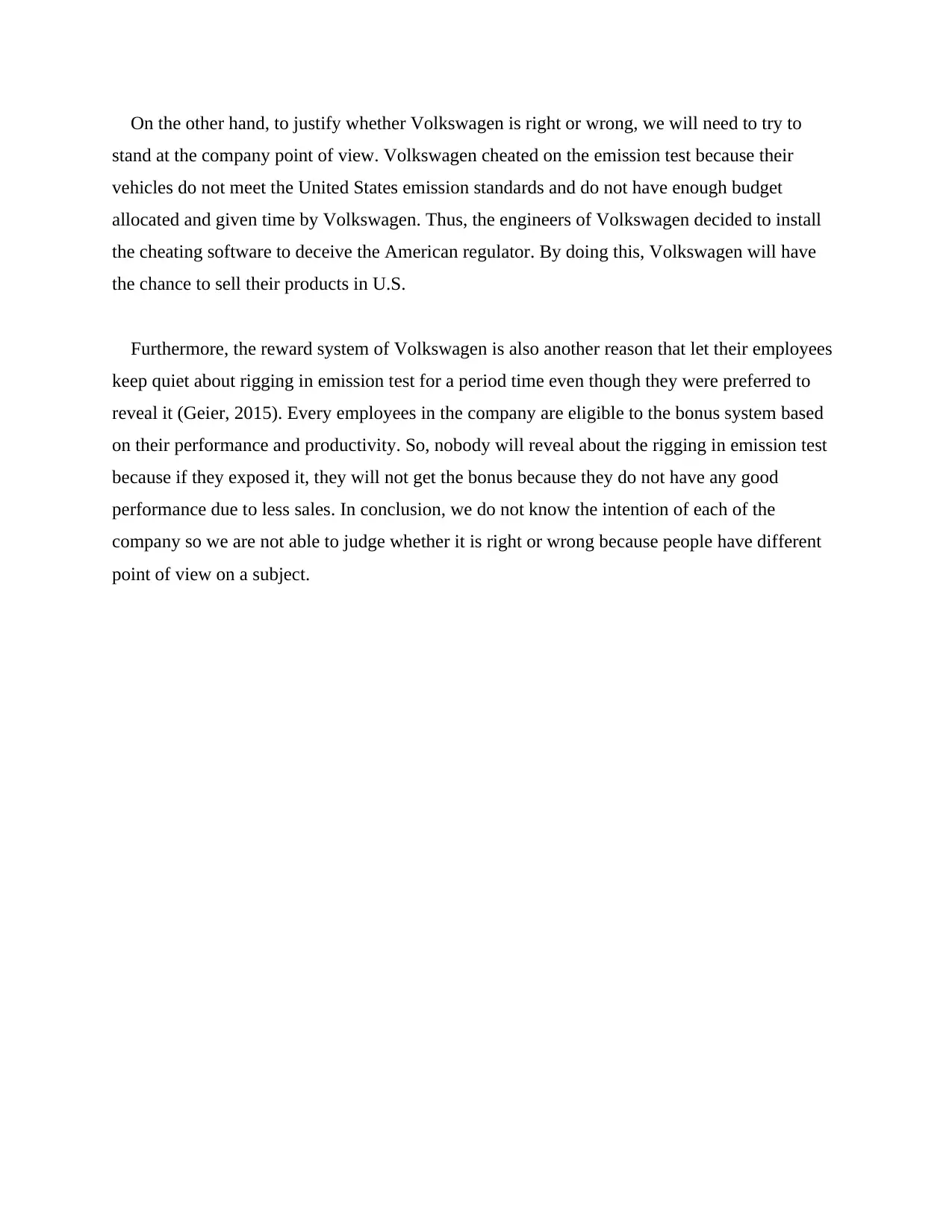
On the other hand, to justify whether Volkswagen is right or wrong, we will need to try to
stand at the company point of view. Volkswagen cheated on the emission test because their
vehicles do not meet the United States emission standards and do not have enough budget
allocated and given time by Volkswagen. Thus, the engineers of Volkswagen decided to install
the cheating software to deceive the American regulator. By doing this, Volkswagen will have
the chance to sell their products in U.S.
Furthermore, the reward system of Volkswagen is also another reason that let their employees
keep quiet about rigging in emission test for a period time even though they were preferred to
reveal it (Geier, 2015). Every employees in the company are eligible to the bonus system based
on their performance and productivity. So, nobody will reveal about the rigging in emission test
because if they exposed it, they will not get the bonus because they do not have any good
performance due to less sales. In conclusion, we do not know the intention of each of the
company so we are not able to judge whether it is right or wrong because people have different
point of view on a subject.
stand at the company point of view. Volkswagen cheated on the emission test because their
vehicles do not meet the United States emission standards and do not have enough budget
allocated and given time by Volkswagen. Thus, the engineers of Volkswagen decided to install
the cheating software to deceive the American regulator. By doing this, Volkswagen will have
the chance to sell their products in U.S.
Furthermore, the reward system of Volkswagen is also another reason that let their employees
keep quiet about rigging in emission test for a period time even though they were preferred to
reveal it (Geier, 2015). Every employees in the company are eligible to the bonus system based
on their performance and productivity. So, nobody will reveal about the rigging in emission test
because if they exposed it, they will not get the bonus because they do not have any good
performance due to less sales. In conclusion, we do not know the intention of each of the
company so we are not able to judge whether it is right or wrong because people have different
point of view on a subject.
⊘ This is a preview!⊘
Do you want full access?
Subscribe today to unlock all pages.

Trusted by 1+ million students worldwide
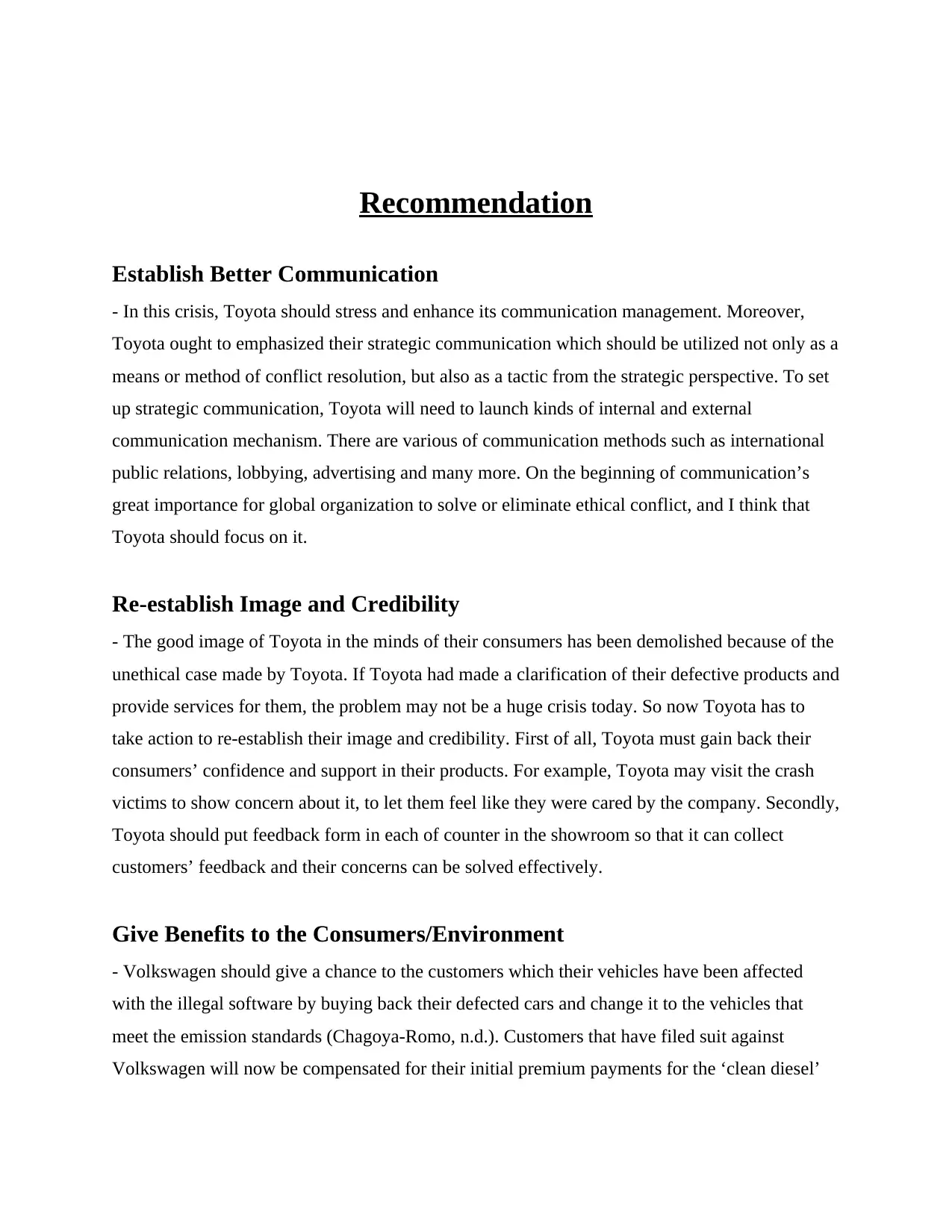
Recommendation
Establish Better Communication
- In this crisis, Toyota should stress and enhance its communication management. Moreover,
Toyota ought to emphasized their strategic communication which should be utilized not only as a
means or method of conflict resolution, but also as a tactic from the strategic perspective. To set
up strategic communication, Toyota will need to launch kinds of internal and external
communication mechanism. There are various of communication methods such as international
public relations, lobbying, advertising and many more. On the beginning of communication’s
great importance for global organization to solve or eliminate ethical conflict, and I think that
Toyota should focus on it.
Re-establish Image and Credibility
- The good image of Toyota in the minds of their consumers has been demolished because of the
unethical case made by Toyota. If Toyota had made a clarification of their defective products and
provide services for them, the problem may not be a huge crisis today. So now Toyota has to
take action to re-establish their image and credibility. First of all, Toyota must gain back their
consumers’ confidence and support in their products. For example, Toyota may visit the crash
victims to show concern about it, to let them feel like they were cared by the company. Secondly,
Toyota should put feedback form in each of counter in the showroom so that it can collect
customers’ feedback and their concerns can be solved effectively.
Give Benefits to the Consumers/Environment
- Volkswagen should give a chance to the customers which their vehicles have been affected
with the illegal software by buying back their defected cars and change it to the vehicles that
meet the emission standards (Chagoya-Romo, n.d.). Customers that have filed suit against
Volkswagen will now be compensated for their initial premium payments for the ‘clean diesel’
Establish Better Communication
- In this crisis, Toyota should stress and enhance its communication management. Moreover,
Toyota ought to emphasized their strategic communication which should be utilized not only as a
means or method of conflict resolution, but also as a tactic from the strategic perspective. To set
up strategic communication, Toyota will need to launch kinds of internal and external
communication mechanism. There are various of communication methods such as international
public relations, lobbying, advertising and many more. On the beginning of communication’s
great importance for global organization to solve or eliminate ethical conflict, and I think that
Toyota should focus on it.
Re-establish Image and Credibility
- The good image of Toyota in the minds of their consumers has been demolished because of the
unethical case made by Toyota. If Toyota had made a clarification of their defective products and
provide services for them, the problem may not be a huge crisis today. So now Toyota has to
take action to re-establish their image and credibility. First of all, Toyota must gain back their
consumers’ confidence and support in their products. For example, Toyota may visit the crash
victims to show concern about it, to let them feel like they were cared by the company. Secondly,
Toyota should put feedback form in each of counter in the showroom so that it can collect
customers’ feedback and their concerns can be solved effectively.
Give Benefits to the Consumers/Environment
- Volkswagen should give a chance to the customers which their vehicles have been affected
with the illegal software by buying back their defected cars and change it to the vehicles that
meet the emission standards (Chagoya-Romo, n.d.). Customers that have filed suit against
Volkswagen will now be compensated for their initial premium payments for the ‘clean diesel’
Paraphrase This Document
Need a fresh take? Get an instant paraphrase of this document with our AI Paraphraser
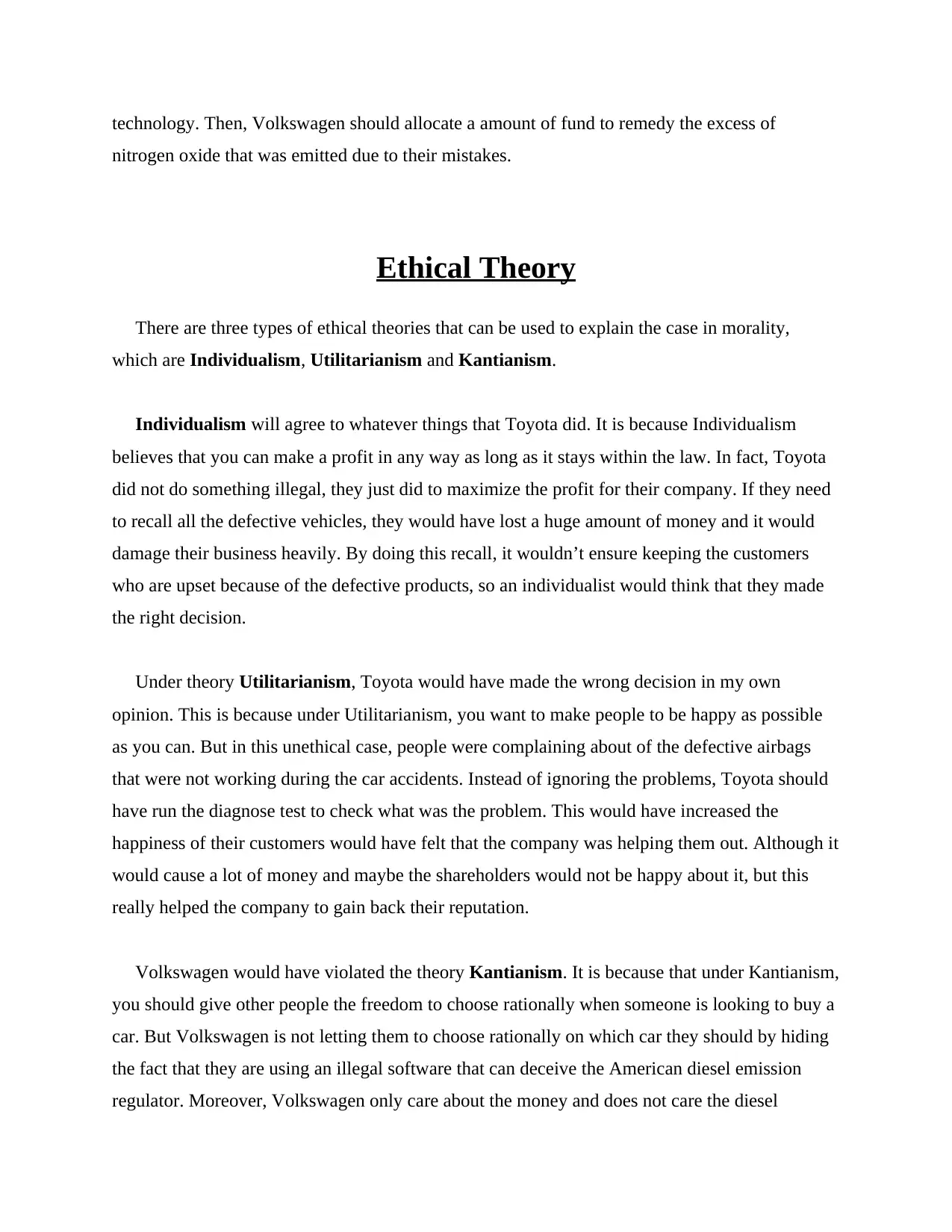
technology. Then, Volkswagen should allocate a amount of fund to remedy the excess of
nitrogen oxide that was emitted due to their mistakes.
Ethical Theory
There are three types of ethical theories that can be used to explain the case in morality,
which are Individualism, Utilitarianism and Kantianism.
Individualism will agree to whatever things that Toyota did. It is because Individualism
believes that you can make a profit in any way as long as it stays within the law. In fact, Toyota
did not do something illegal, they just did to maximize the profit for their company. If they need
to recall all the defective vehicles, they would have lost a huge amount of money and it would
damage their business heavily. By doing this recall, it wouldn’t ensure keeping the customers
who are upset because of the defective products, so an individualist would think that they made
the right decision.
Under theory Utilitarianism, Toyota would have made the wrong decision in my own
opinion. This is because under Utilitarianism, you want to make people to be happy as possible
as you can. But in this unethical case, people were complaining about of the defective airbags
that were not working during the car accidents. Instead of ignoring the problems, Toyota should
have run the diagnose test to check what was the problem. This would have increased the
happiness of their customers would have felt that the company was helping them out. Although it
would cause a lot of money and maybe the shareholders would not be happy about it, but this
really helped the company to gain back their reputation.
Volkswagen would have violated the theory Kantianism. It is because that under Kantianism,
you should give other people the freedom to choose rationally when someone is looking to buy a
car. But Volkswagen is not letting them to choose rationally on which car they should by hiding
the fact that they are using an illegal software that can deceive the American diesel emission
regulator. Moreover, Volkswagen only care about the money and does not care the diesel
nitrogen oxide that was emitted due to their mistakes.
Ethical Theory
There are three types of ethical theories that can be used to explain the case in morality,
which are Individualism, Utilitarianism and Kantianism.
Individualism will agree to whatever things that Toyota did. It is because Individualism
believes that you can make a profit in any way as long as it stays within the law. In fact, Toyota
did not do something illegal, they just did to maximize the profit for their company. If they need
to recall all the defective vehicles, they would have lost a huge amount of money and it would
damage their business heavily. By doing this recall, it wouldn’t ensure keeping the customers
who are upset because of the defective products, so an individualist would think that they made
the right decision.
Under theory Utilitarianism, Toyota would have made the wrong decision in my own
opinion. This is because under Utilitarianism, you want to make people to be happy as possible
as you can. But in this unethical case, people were complaining about of the defective airbags
that were not working during the car accidents. Instead of ignoring the problems, Toyota should
have run the diagnose test to check what was the problem. This would have increased the
happiness of their customers would have felt that the company was helping them out. Although it
would cause a lot of money and maybe the shareholders would not be happy about it, but this
really helped the company to gain back their reputation.
Volkswagen would have violated the theory Kantianism. It is because that under Kantianism,
you should give other people the freedom to choose rationally when someone is looking to buy a
car. But Volkswagen is not letting them to choose rationally on which car they should by hiding
the fact that they are using an illegal software that can deceive the American diesel emission
regulator. Moreover, Volkswagen only care about the money and does not care the diesel
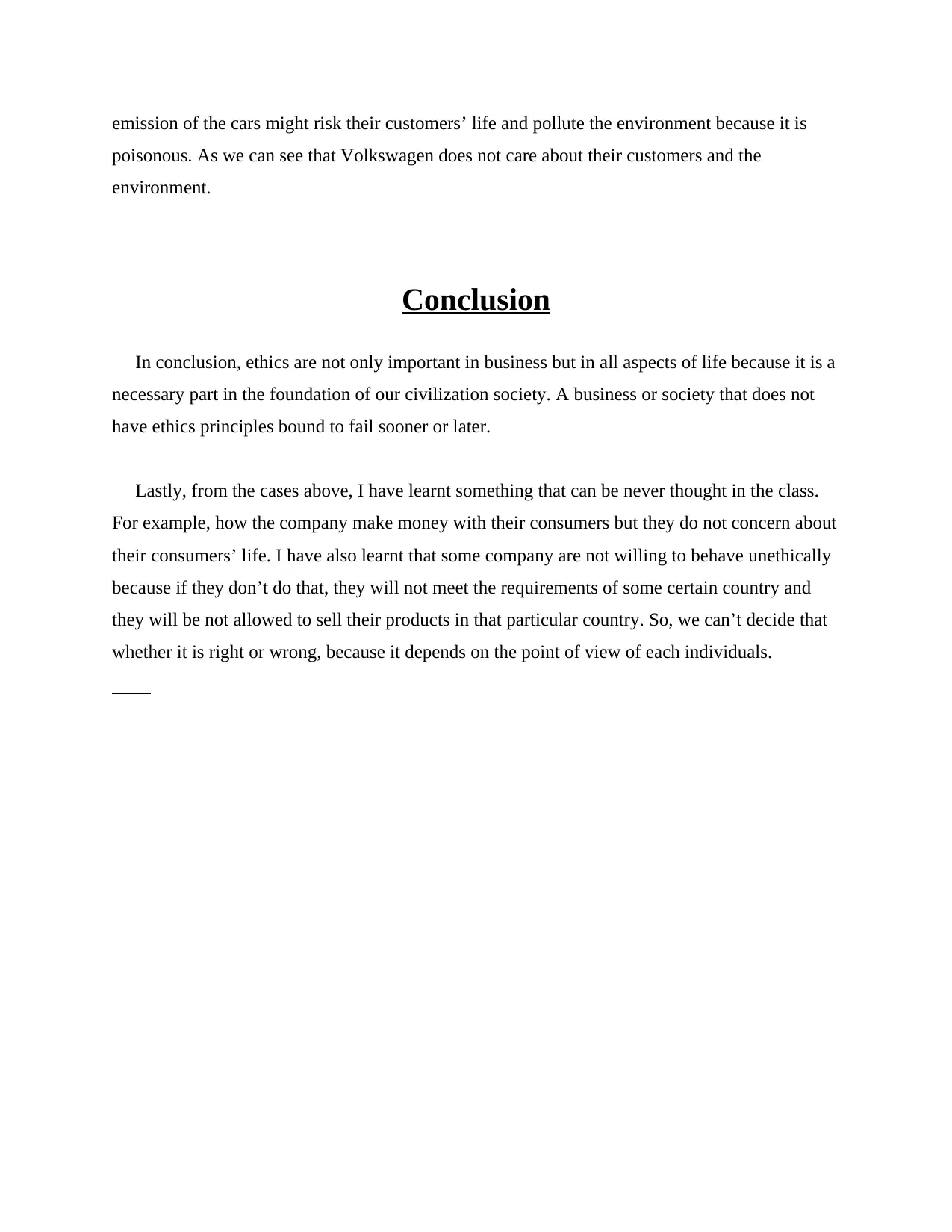
emission of the cars might risk their customers’ life and pollute the environment because it is
poisonous. As we can see that Volkswagen does not care about their customers and the
environment.
Conclusion
In conclusion, ethics are not only important in business but in all aspects of life because it is a
necessary part in the foundation of our civilization society. A business or society that does not
have ethics principles bound to fail sooner or later.
Lastly, from the cases above, I have learnt something that can be never thought in the class.
For example, how the company make money with their consumers but they do not concern about
their consumers’ life. I have also learnt that some company are not willing to behave unethically
because if they don’t do that, they will not meet the requirements of some certain country and
they will be not allowed to sell their products in that particular country. So, we can’t decide that
whether it is right or wrong, because it depends on the point of view of each individuals.
poisonous. As we can see that Volkswagen does not care about their customers and the
environment.
Conclusion
In conclusion, ethics are not only important in business but in all aspects of life because it is a
necessary part in the foundation of our civilization society. A business or society that does not
have ethics principles bound to fail sooner or later.
Lastly, from the cases above, I have learnt something that can be never thought in the class.
For example, how the company make money with their consumers but they do not concern about
their consumers’ life. I have also learnt that some company are not willing to behave unethically
because if they don’t do that, they will not meet the requirements of some certain country and
they will be not allowed to sell their products in that particular country. So, we can’t decide that
whether it is right or wrong, because it depends on the point of view of each individuals.
⊘ This is a preview!⊘
Do you want full access?
Subscribe today to unlock all pages.

Trusted by 1+ million students worldwide
1 out of 14
Related Documents
Your All-in-One AI-Powered Toolkit for Academic Success.
+13062052269
info@desklib.com
Available 24*7 on WhatsApp / Email
![[object Object]](/_next/static/media/star-bottom.7253800d.svg)
Unlock your academic potential
Copyright © 2020–2026 A2Z Services. All Rights Reserved. Developed and managed by ZUCOL.




